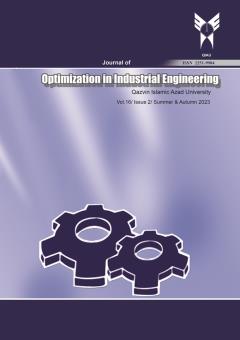On characterizing efficient and properly efficient solutions for multi- objective programming problems in a complex space
Subject Areas : Design of ExperimentHamiden Abd Elwahed 1 * , Alhanouf Alburaikan 2 , Florentin Smarandache 3
1 - Operations Research- Faculty of Graduate Studies for Statistical Research- Cairo University
2 - Department of Mathematics, College of Science and Arts, Qassim University, Al- Badaya 51951 Saudi Arabia,
3 - Mathematics Department, University of New Mexico, 705 Gurley Ave, Gallup, NM87301, USA
Keywords: optimal solution, Efficient solution, Complex multi- objective programming, Kuhn-Tuckers' conditions,
Abstract :
Multi-objective optimization problems arise when more than one objective function is to be minimized over a given feasible region. Unlike the traditional mathematical programming with a single-objective function, an optimal solution in the sense of one that minimizes all the objective functions simultaneously does not necessarily exist in multi-objective optimization problems, and whence, we are troubled with conflicts among objectives in decision-making problems with multiple objectives. Applications of complex programming may be found in Mathematics, engineering, and in many other areas. In earlier works in the field of complex programming problem, all the researchers have considered only the real part of the objective function of the problem as the objective function of the problem neglecting the imaginary part of the objective function, and the constraints of the problem have considered as a cone in the complex space C^n In this paper, a complex non- linear programming problem with the two parts (real and imaginary) is considered. The efficient and proper efficient solutions in terms of optimal solutions of related appropriate scalar optimization problems are characterized. Also, the Kuhn-Tuckers' conditions for efficiency and proper efficiency are derived. This paper is divided into two independently parts: The first provides the relationships between the optimal solutions of a complex single-objective optimization problem and solutions of two related real programming problems. The second part is concerned with the theory of a multi-objective optimization in complex space
Abrams, R. A., and Ben- Israel, A. (1971). Nonlinear programming in complex space: Necessary conditions. SIAM Journal on Control, (9): 606- 620.
Abrams, R. A. (1972). Nonlinear programming in complex space: Sufficient conditions and duality. Journal of Mathematical Analysis and Applications, (38): 619- 632.
Berman, A. Cones Matrices and Mathematical Programming, Lecture Notes in Economic and Mathematical Systems, Vol.79, Springer, Berlin, 1973.
Borwein, J. (1977). Proper efficient points for maximization with respect cones. SIAM Journal, Control and Optimization, (15): 57- 63.
Chankong, V., and Haimes, Y. Multiobjective Decision Making: Theory and Methodology, Elseiver, Science Publishing Company, Inc., 1983.
Craven, B. D., and Mond, M. On duality in complex linear programming. Journal of the Australian Mathematical Society, (44): 172- 175.
Duca, D. I. (1980). Proper efficiency in the complex vectorial programming, Studia University, Babes- Bolyai, Mathematica,(25): 73- 80.
Emmerich,M. T. M., and Deutz, A. H. (2018). A tutorial on multiobjective optimization: Fundamental and evolutionary methods. Natural Computing, 17(3): 585- 609. https://dx.doi.org/10.1007%2Fs11047-018-9685-y.
Ferrero, O. (1992). On nonlinear programming in complex spaces. Journal of Mathematical Analysis and Applications, 164(2):399- 441.
Gunantara, N., and Ai, Q. (2018). A review of multi- objective optimization and its applications. Cogent Engineering, 5(1):1502242. https://doi.org/10.1080/23311916.2018.1502242.
Hanna, M. A., and Simaan, M. (1985). A closed- Form solution to a quadratic optimization problem in complex variables. Journal of Optimization Theory and Applications, (47): 437- 450.
Henig, M. I. (1983). Proper efficiency with respect to cones. Journal of Optimization, Theory and Applications, (36): 387- 407.
Huang, T- Y., and Ho, S-C. (2021). Optimality and duality for multiobjective fractional programming in complex spaces. The Bulletin of the Malaysian Mathematical Society Series 2, 44(1): 3895- 3906.
Huang, T-Y., and Tanaka, T. (2022).Optamility and duality for complex multi- objective programming. Numerical Algebra, Control and Optimization, 12(1): 121- 134.
Hsu, C- Y., and Huang, T- Y. (2022). Second- ordered parameters duality for the multi- objective programming problem in complex space. Axioms, 11(12): 717.
Jiang, J., and Fan, N. J. (2020). Multiobjective and categorical global optimization of photonic structures based on ResNet generative neural networks. Nanophotonics, 10(1):361- 369. https://doi.org/10.1515/nanoph-2020-0407.
Khalifa, H. A., Kumar, P., and Smarandache, F. (2020). On optimizing neutrosophic complex programming using Lexicographic, order. Neutrosophic Sets and Systems, (32): 331-343.
Lv, J., Peng, Z., and Wan, Z. (2022). Approximate Karush- Kuhn- Tucher condition for multi- objective optimistic bilevel programming problems. Journal of Industrial and Management Optimization, 20(1): 270- 299.
Malakooti, B. (2010). The complex interior- boundary method for linear and nonlinear programming with linear constraints. Applied Mathematics& Computation, (216): 1903- 1917.
Mond, B., and Greenblatt, Z. (1975). A note on duality for complex linear programming. OPSEARCH, (12): 119- 123.
Mond, B., and Craven, B. D. (1977). Sufficiency optimality conditions for complex programming with quasi- concave constraints. Mathematische Operations- forschung und Statistik, (8): 445- 453.
Rockafellar, R. T. Convex Analysis , Princeton University Press, Princeton, New Jersy, 1970.
Roussel, R., Hanuka, A., and Edelen, A. (2021). Multiobjective Bayesian optimization for online accelerator tuning. Physical Review Accelerators and Beams, 24(6) 062801. DOI:https://doi.org/10.1103/PhysRevAccelBeams.24.062801.
Smart, I., and Mond, B. (1991). Complex nonlinear programming: duality with invexity and equivalent real program. Journal of Optimization Theory and Applications, (69):469- 48.
Youness and Elborolosy (2004) formulated the problem in complex space taking into account the two parts of complex objective function (real and imaginary together) and introduced an extension to necessary optimality conditions in complex programming.
Zhang, S., and Xia, Y. (2016). Two fast complex- valued algorithms for solving complex quadratic programming problems. IEEE Transactions Cybernetics, 46(12): 2837—2847.
Zhang, S., and Xia, Y. (2018). Solving nonlinear optimization problems of real functions in complex variables by complex-valued iterative methods. IEEE Transactions Cybernetics, 48(1): 277-287. DOI: 10.1109/tcyb.2016.2632159.

